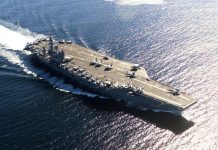In a move supported by the British government, Saudi Arabia has reportedly requested to become an equal participant alongside the UK, Japan, and Italy in their collaborative endeavor to develop the next-generation fighter aircraft.
The development involves companies from the UK, Japan, and Italy joining forces to build next-generation fighter aircraft and complementary systems like drones under the banner of the Global Combat Air Program (GCAP).
The program’s ambitious objective is to roll out a highly advanced, exportable fighter jet by 2035. Citing five senior officials from London, Tokyo, and Rome, the Financial Times reported that Britain and Italy are exploring supporting the Kingdom’s involvement in the Global Combat Air Program (GCAP).
Saudi Arabia’s interest in the project may also be influenced by the delays it has experienced in obtaining a second tranche of Eurofighter Typhoon aircraft from the UK.
The delays are primarily attributed to opposition from Germany, one of the four partners in the Eurofighter project.

Germany enforced a weapons embargo on Saudi Arabia in 2018, citing the Kingdom’s engagement in the Yemen conflict and the assassination of journalist Jamal Khashoggi.
In mid-July, Berlin announced its refusal to support the imminent delivery of Typhoon aircraft to Saudi Arabia. Saudi Arabia stands as one of the world’s largest purchasers of defense imports, primarily sourced from the United States.
Nonetheless, Riyadh has significantly invested billions of dollars into domestic defense initiatives in recent years.
The inclusion of Saudi Arabia in the program might hold appeal for partners due to the prospect of cost-sharing with one of the globe’s largest defense spenders. Yet, it could potentially generate strains between them.
Moreover, the move could complicate the intricate negotiations encompassing three governments and multiple companies from each nation.
The report noted that Riyadh aims to commit “tens of billions of dollars” to fund the GCAP and potentially provide engineering expertise.
Through its participation in the project, Saudi Arabia seeks to progress its overarching objective of transitioning from a significant importer to a self-sufficient producer of defense technology and weaponry within the domestic context.
Japan Displays Reluctance
Among the trio of GCAP partners, the UK is taking the lead in facilitating Saudi Arabia’s inclusion; however, Japanese authorities have reportedly vehemently voiced their opposition to Saudi Arabia’s participation.
Shashank S. Patel, a keen observer of Japanese defense and geopolitical trends, told EurAsian Times, “The Japanese government is more concerned about the national narrative if they allow Saudis to join the Global Combat Air Program (GCAP). The snap general elections are on the verge amid ever-low approval rating of the Kishida government.”
Japan lifted its longstanding prohibition on arms exports in 2014 and is currently deliberating the relaxation of these restrictions to expand its global reach through GCAP.
However, according to the Financial Times, Japanese officials argue that including Saudi Arabia in this context would introduce more complexity into the discussions concerning the countries where Tokyo can export its arms.
Similarly, Patel noted that the move “will raise consequential questions over arms exports policy where Liberal Democratic Party’s (LDP) stand is very selective in choosing countries. Major factions do not favor expanding the current ‘set of countries,’ which will provoke CDPJ or DPJ to align in current party moderation processes.”

He remarked, “Tokyo’s coterie has objections over Saudi’s controversial past in the Gulf region which may significantly complicate future exports of the Tempest jets.”
Additionally, the project is already confronted with a stringent deadline. Adding a fourth member would extend the timeline, a prospect Japan is unwilling to consider.
Patel also pointed out that “Japan also has a caveat over what technological edge will Saudi add apart from finances. The security angle also cannot be denied here. Japan believes the expansion will further prone GCAP security in sensitive techs & related specifics, which is already tripartite.”
Furthermore, this project holds a distinct significance for Japan as it marks the first instance of independent implementation without the US as a partner country. Timely execution is crucial for Japan, given its distinctive global position.
According to Patel, Japan’s deliberate decision to proceed without the US also carries significant implications for the future.
Nonetheless, Saudi Arabia has expressed interest in joining the Tempest project for a considerable period.
In March, it inked a memorandum of understanding with the UK, outlining a “partnering feasibility study” to explore a potential combat air partnership and closer industrial cooperation.
Saudi Arabia’s defense minister, Khalid bin Salman, tweeted about the deal, suggesting the country’s participation in the international jet endeavor. However, the UK promptly clarified that it was a separate agreement.
Presently, discussions regarding Saudi Arabia’s formal participation appear to be in the early phases and overseen by the UK Ministry of Defense.
Saudi Arabia has been striving to reduce its reliance on the United States for armaments and is trying to bolster its domestic arms industry.
- Contact the author at ashishmichel(at)gmail.com
- Follow EurAsian Times on Google News




